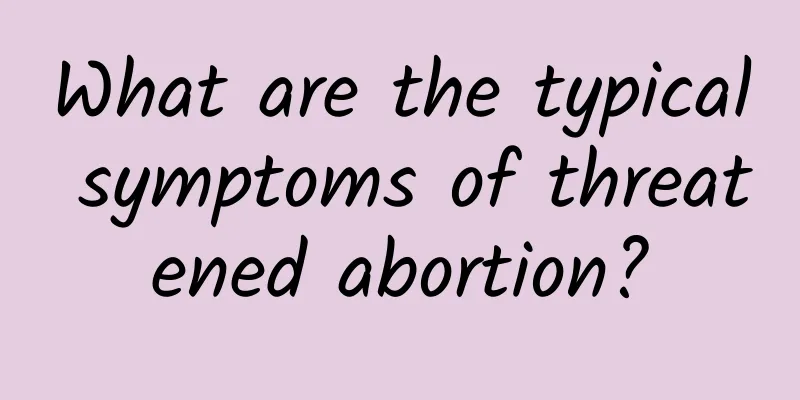Attention: Nine common symptoms of uterine fibroids

|
What are the symptoms of uterine fibroids? Uterine fibroids are relatively serious among gynecological diseases. Only when women correctly understand the symptoms of uterine fibroids can they treat them in time. So what are the symptoms of uterine fibroids? Let's take a look at how experts answer the question of the symptoms of uterine fibroids. Common symptoms of uterine fibroids include: 1. Pain: Generally, uterine fibroids do not cause pain symptoms. If pain symptoms occur, it is mostly caused by pathological changes in the fibroids themselves or combined with other pelvic diseases. 2. Anemia: The main symptom of uterine fibroids is uterine bleeding. Long-term excessive menstruation or irregular bleeding can lead to hemorrhagic anemia. Clinically, there are different degrees of anemia symptoms. 3. Hypoglycemia: Hypoglycemia associated with uterine fibroids is also rare. The main symptoms are low fasting blood sugar, loss of consciousness and even shock. The symptoms can completely disappear after glucose injection. The symptoms of hypoglycemia will completely disappear after tumor resection. 4. Uterine bleeding: Uterine bleeding is the most common symptom of uterine fibroids. Clinically, it can be manifested as menorrhagia, cyclical bleeding, increased menstrual flow, often accompanied by prolonged menstruation, frequent menstruation, shortened menstrual cycle, and increased menstrual flow. 5. Abdominal mass: The uterus is located deep in the pelvic cavity, and no mass can be felt in the abdomen when the fibroids first occur. 6. Vaginal discharge: Uterine submucosal fibroids or cervical submucosal fibroids can cause increased leucorrhea. Once the tumor is infected, there may be a large amount of purulent leucorrhea. If there is ulceration, necrosis, and bleeding, there may be bloody or purulent vaginal discharge with a foul odor. 7. Infertility and miscarriage. 8. Polycythemia: The main diagnostic basis is increased hemoglobin and red blood cell counts. No other cause of polycythemia can be found except uterine fibroids. After tumor resection, hemoglobin and red blood cells return to normal. 9. Compression symptoms: frequent urination and urgency; when the cervical fibroids grow forward to a considerable size, they can also cause bladder compression and lead to upper pubic discomfort, frequent urination, urinary retention or overflow incontinence The above are the symptoms of early uterine fibroids. Do you understand the symptoms of uterine fibroids? If you still have questions about the symptoms of uterine fibroids, please consult our online experts, who will give you detailed answers. Uterine fibroids http://www..com.cn/fuke/zgjl/ |
<<: How can women correctly diagnose ovarian cysts?
>>: Eight key points to easily prevent and treat uterine fibroids!
Recommend
What should you pay attention to in preventing threatened abortion?
The harm of threatened abortion is so great. What...
Don’t be afraid of getting fat by eating ice cream! Kumquat lemon konjac super slimming
It is such a pleasant thing to eat a bowl of icy ...
What are the treatments for bacterial vaginosis? The last one must be done
Bacterial vaginitis is a type of female vaginitis...
Eat too much during Chinese New Year? Homemade 2 kinds of anti-edema drinks
During the Chinese New Year, people do nothing bu...
Experts show you how vaginitis spreads
In today's society, women are prone to vagini...
If you want a strong heart, you need the strength of your legs! 4 Tips for Walking to Rejuvenate
To tell whether your heart is strong enough, you ...
Expert advice: Common and effective methods to relieve dysmenorrhea
How to relieve dysmenorrhea is a matter of great ...
Which women are prone to cervical erosion?
According to statistics, 60%-80% of married or ch...
People who are suitable for medical abortion
Women with unexpected pregnancy can use artificia...
Why is the white blood cell count not high in pelvic inflammatory disease?
Why is the white blood cell count not high in pel...
Introduction to several treatment misunderstandings of cervical erosion that need attention
It is understood that there are still many misund...
Experts analyze the causes of irregular menstruation
Irregular menstruation is one of the common disea...
What are the symptoms of cervical warts?
Genital warts may be familiar to many people, but...
What to do if your menstrual period is irregular
Irregular menstruation is a common problem for wo...
Abortion complications can lead to infertility
Artificial abortion refers to the operation of te...









